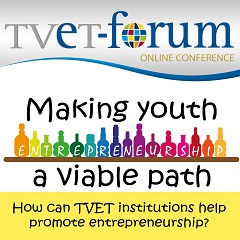
The UNESCO-UNEVOC International Centre: Who We Are | What We Do | Working With Us | Get in Touch
The UNEVOC Network: Learn About the Network | UNEVOC Network Directory
For Members: UNEVOC Centre Dashboard
Thematic Areas: Inclusion and Youth | Digital Transformation | Private Sector Engagement | SDGs and Greening TVET
Our Key Programmes & Projects: BILT: Bridging Innovation and Learning in TVET | Building TVET resilience | TVET Leadership Programme | WYSD: World Youth Skills Day
Past Activities: COVID-19 response | i-hubs project | TVET Global Forums | Virtual Conferences | YEM Knowledge Portal
Our Services & Resources: Publications | TVET Forum | TVET Country Profiles | TVETipedia Glossary | Innovative and Promising Practices | Toolkits for TVET Providers | Entrepreneurial Learning Guide
Events: Major TVET Events | UNEVOC Network News
 In this ongoing of UNESCO-UNEVOC’s virtual conferences, we are discussing youth entrepreneurship in technical and vocational education and training (TVET). The conference is taking place from 18 to 29 July 2016 on the UNESCO-UNEVOC TVeT Forum.
In this ongoing of UNESCO-UNEVOC’s virtual conferences, we are discussing youth entrepreneurship in technical and vocational education and training (TVET). The conference is taking place from 18 to 29 July 2016 on the UNESCO-UNEVOC TVeT Forum.
Statistical forecasts paint a challenging picture for today’s youth. The World Bank estimates that the global economy needs 600 million new jobs over the next ten years just to keep employment rates constant, while the International Labour Organization (ILO) reports almost 36% of the world’s unemployed—nearly 73.3 million people—are young people, and adding under-employed youth to this account trebles the total (ILO, 2015![]() ). Furthermore, over 169 million youth earn less than US$2 per day, representing more than one third of the working poor in developing countries.
). Furthermore, over 169 million youth earn less than US$2 per day, representing more than one third of the working poor in developing countries.
Clearly, in today and tomorrow’s economy, being young and looking for employment is not an easy task.
In this context, youth entrepreneurship can play an important part in facilitating economic development and job creation. While young people often turn to self-employment because they cannot find jobs elsewhere, entrepreneurship can provide them with valuable skills such as critical thinking, decision-making, leadership, teamwork and innovation—all of which remain relevant for the rest of their lives. In general, they gain expertise in areas not incorporated in traditional education, constructing unique careers that resonate outside the typical economic model by pulling in talent from their peers and fostering positive community development.
Considering youth’s enormous entrepreneurial potential, governments, practitioners, and policymakers need to focus more on the challenges that young people face when starting and growing successful businesses while at the same time concentrating on policies and programmes that have the ability of unleashing the potential of young entrepreneurs. It is interesting to note that ‘Fostering youth employment and entrepreneurship’ is one of the three priority areas in UNESCO’s Strategy for Technical and Vocational Education and Training (2016-2021).
In this virtual conference we aim to explore some of the key challenges young entrepreneurs face and the skills they require in order to develop successful ventures, as well as the role that technical and vocational education and training (TVET) can play in helping develop some of these skills.
With this in mind, the virtual conference will address the following questions:
Claudia Pompa
 Claudia is a specialist on workforce and skills development, with a particular experience in youth entrepreneurship, vocational training, and small and medium sized enterprise development. She has twelve years of experience as an international development consultant and technical adviser and has worked extensively in Africa, Asia and the Pacific, Latin America, and the Arab States. Her work involved designing, implementing, monitoring and evaluating complex development programmes, particularly focused on entrepreneurship and business development strategies and programmes, across a number of government and non-government organizations.
Claudia is a specialist on workforce and skills development, with a particular experience in youth entrepreneurship, vocational training, and small and medium sized enterprise development. She has twelve years of experience as an international development consultant and technical adviser and has worked extensively in Africa, Asia and the Pacific, Latin America, and the Arab States. Her work involved designing, implementing, monitoring and evaluating complex development programmes, particularly focused on entrepreneurship and business development strategies and programmes, across a number of government and non-government organizations.